Movie Review – Bourne Ultimatum, The
– Summary –
Director : Paul Greengrass
Year Of Release : 2007
Principal Cast : Matt Damon, Joan Allen, David Strathairn, Julie Stiles, Scott Glenn, Paddy Considine, Albert Finney, Edgar Ramirez, Tom Gallop, Daniel Bruhl, Joey Ansah, Colin Stinton.
Approx Running Time : 116 Minutes
Synopsis: Jason Bourne continues to track his past through the CIA, as operation Black Briar comes to a head and the Agency tries desperately to cover its tracks.
What we think : Ripping conclusion to the Bourne trilogy (prior to Legacy’s release with a new leading man) sees a lot of the mystery and subterfuge of Jason’s finally revealed, as he tracks down those who “created” the assassin he became. An instant classic of the genre, Paul Greengrass’ direction here is again first class, although were you not a fan of his patented shaky-cam style in Supremacy, you’ll leave this one equally disappointed. Action-packed, labyrinthine, visceral: The Bourne Ultimatum is a terrific film in its own right, and a worthy conclusion to a trilogy of exceptional storytelling.
**********************
Jason’s final blow-out?
So, you come to the third film of an established franchise, and typically you’d be grinding the gears of familiarity and delivering a story with merely a passing resemblance to, or derivation of, that which has come before. Not so with Ultimatum, the third and concluding chapter (so far) in Matt Damon’s essaying of Jason Bourne, the amnesiac CIA operative trying to uncover his true identity while being pursued by those wanting to keep him quiet. The Bourne Ultimatum might well be called The Bourne Supremacy 2.1, because the film picks up immediately (and I do mean immediately) after the end of Supremacy’s low-key conclusion, where Bourne apologizes to a young woman for the death of her parents by his hand; Tony Gilroy’s script (and I must stipulate that he wasn’t the sole writer here, with Scott Burns and George Nolfi brought in to massage the detail into shape, a fact not lost on Gilroy after the fact) tries to tie up all the loose ends and story beats established in the previous two films, and it’s worth noting that after watching all three films in rapid succession, it’s easy to spot links and symbiosis between all three, giving all three films a sense of completion. Ultimatum is essentially Jason Bourne’s epiphany, his finding peace with himself and trying to find repentance for what he perceives as transgressions, having murdered all those people in the name of the CIA. Does it work, though? Without Franka Potente as his emotional center, or even without an enemy he can face down, is Bourne’s final journey something of a let-down? Or is it (as I hoped) a solid, worthwhile conclusion to a well-thought-out saga that delivers the resolution audiences will find appealing?
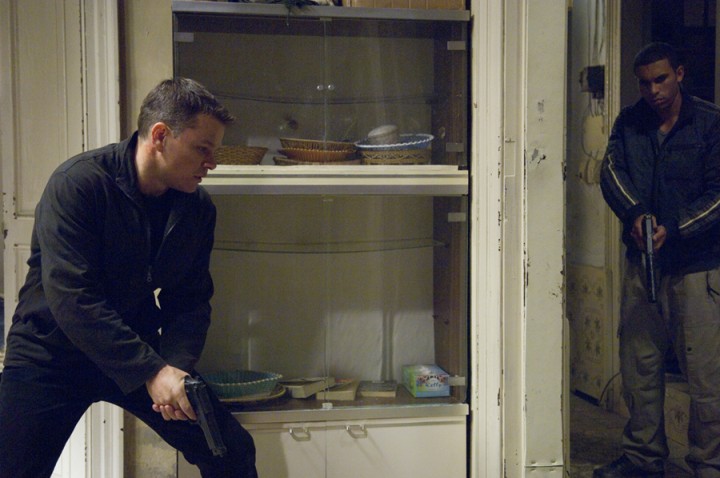
Jason Bourne (Matt Damon), still on the run in Moscow after tracking down the daughter of his first two victims, escapes CIA capture and disappears. Meanwhile, a British journalist, Simon Ross (Paddy Considine) meets with a CIA agent in Turin, Italy, for information pertaining the Treadstone’s descendant, an operation known as Black Briar. This triggers the CIA’s analysts into action, and Jason Bourne – visiting Paris to meet with Marie’s brother (Daniel Bruhl, in a small role) and inform him of her death – also becomes involved again as he tries to get to the bottom of Black Briar’s meaning in his amnesia. Ross is killed by a Black Briar assassin, leaving Bourne with no option but to track down the CIA informant in Turin, who has now fled to Morocco. Bourne “kidnaps” CIA agent Nikki Parsons (Julia Stiles) and takes her to Morocco, where he locates the information needed to understand his past – a CIA doctor based in New York. Infiltrating New York, Bourne is tracked by the CIA task-force led by Deputy Director Noah Volsen (David Strathairn), with Pamela Landy (Joan Allen) once again involved. Bourne sees that there is a strained relationship between Landy and Volsen – the latter wants to bury Black Briar from the public, while Landy wants to blow it wide open and reveal the truth, that the operation is a covert black-ops with no oversight. As Bourne gets closer to uncovering the truth, he has violent visions of flashbacks to his training and indoctrination, particularly of apparent Treadstone chief medical officer Albert Hirsch (Albert Finney), the only man who can unlock Bourne’s mind and fill in the blanks.
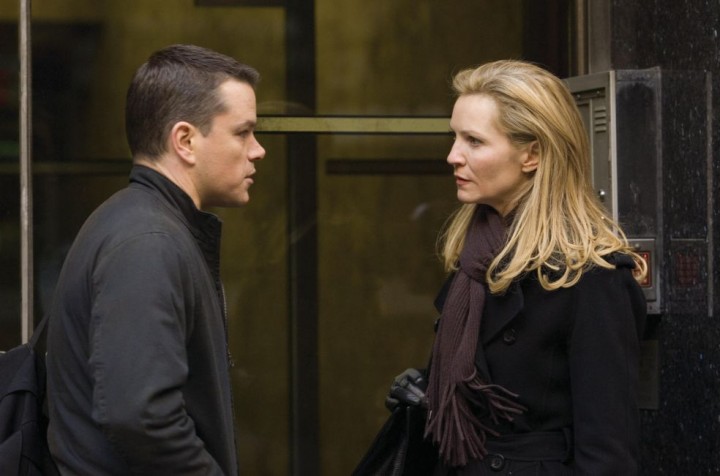
Although filmed a year or so after Supremacy delivered terrific excitement, Ultimatum takes place as if Supremacy’s closing credits never occurred. Visually, stylistically, dramatically, both Supremacy and Ultimatum are the same film cut in half, there’s virtually no appreciable difference in quality. Paul Greengrass returns to the director’s chair, John Powell to the musical orchestrations, editor Christopher Rouse to the chopping bay, and Supremacy leads Matt Damon, Joan Allen, and Julia Stiles (the latter in a considerably larger role here than in the previous two films’ combined) front and center once again. Screen legends in David Strathairn and Scott Glenn, as CIA taskmasters and dubious players in Treadstone/Black Briar’s influence, also make their franchise debuts, while Paddy Considine and Albert Finney add British flavor to proceedings. Using this wonderful cast, even in the smallest roles, Greengrass populates his film with actors capable of elevating this admittedly pulpy material into something approaching a work of cinematic art. Although using his now-typical hand-held camera style, filled with close-ups and eye-tearing focus pulls, which alienates many viewers with its discombobulating, frantic nature, Greengrass carves out a genuinely exciting, twisting, turning race-n-chase flick that delivers adrenaline-pumping action and pants-wetting tension.
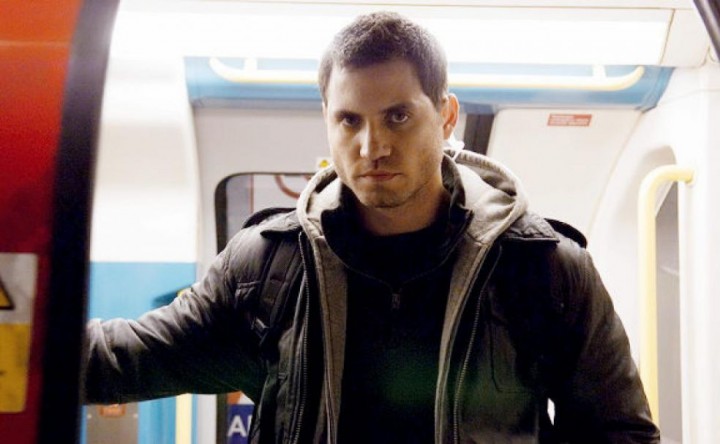
Unsurprisingly, Jason Bourne’s journey did not end at the conclusion of Supremacy, and nor should it, considering a lot of his mysterious past was still left unsolved. Ultimatum, part atonement for Bourne and part revenge quest (again, it seems like Bourne doesn’t want to be the killer he signed up to become), eventually unspools with an enigmatic journey into CIA brainwashing and behavior modification, although the result is more cliched symbolism than definitive resolution; what’s more troubling for Bourne is that apparently he agreed to this assignment, “for the good of the country”. This dichotomy, having agreed to become an assassin, before losing his memory and then deciding he didn’t want to be one any longer, drives much of the emotional baggage for Bourne throughout the film (and indeed, throughout the trilogy). While the film isn’t deep on discussing the paradox, nor even trying to argue one way or the other (probably a good thing, lest you alienate somebody in the audience), Ultimatum uses this swiftly plotted story device as a pond on which to skim its narrative stones, creating ripples but never really sinking in.

Greengrass’s direction is, as with Supremacy, solid as a rock. His camera is sharp and focused, dwelling relentlessly on Bourne’s mission, and the CIA’s fumbling of their attempts to capture or kill him. While it never portrays the CIA as thoroughly incompetent, there’s a level of inefficiency and befuddling bureaucracy to the actions the agency takes to get the job done. Volsen and Landy are both adequately trained, and have plenty of disposable henchmen at their service to do the job, but Bourne remains a step above. The words of Nikki in Supremacy come back to haunt the CIA again – “he doesn’t make mistakes. He doesn’t do random.” Greengrass evokes a heart-quickening, post-9/11 CIA, hell bent on rooting Bourne out at almost any cost, even if it means putting the public in jeopardy (something Landy is against), and it’s somewhat apropos even now considering the eye of the intelligence gathering storm around the USA (and many other countries) is still in the public’s eyeline. What do they say about history repeating? Anyways, Greengrass directs the hell out of this film, shot in a variety of locations around the globe, but once again feeling contiguous in nature within the film series, rather than taking the James Bond route of glamor over gritty.
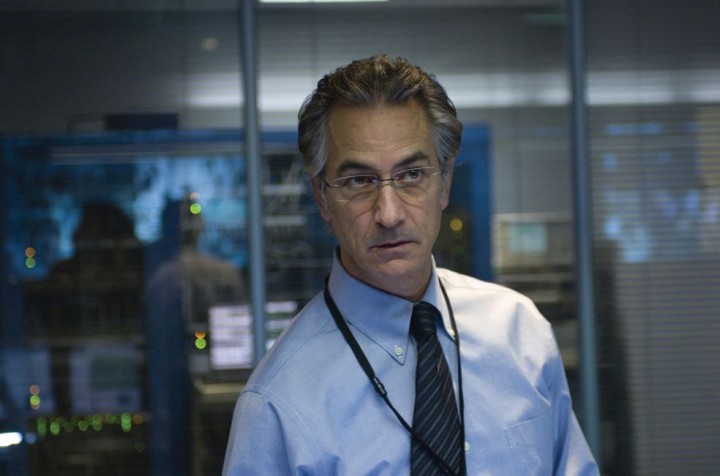
Matt Damon’s performance is on par with the previous films. He never really develops as a character, does Bourne, other than he has this drive to find out who he is, and why he is the way he is. This journey is probably more for our sake, an assassin-by-proxy avatar designed to ask us to what lengths our country should go to protect its interests. Bourne’s not really all that chatty, either, although his apparent – and hitherto un-hinted at – history with Nikki Parsons (were they lovers at one point?) is given just enough time to marinate to offer at least some kind of depth to him as a character. Parsons, meanwhile, has a larger role here (Stiles must have been happy) as she aides Bourne through his actions in Morocco. Joan Allen spends a large amount of the film pretending to sulk at her CIA colleagues, while David Strathairn channels Chris Cooper (from The Bourne Identity) as the lead agent tasked with taking Bourne down. Once again, like Cooper’s Conklin in the first film, Volsen has a hidden agenda, and it unravels once Bourne arrives on the scene. Albert Finney chews the scenery as Dr Hirsch, while Paddy Considine has a good time as a journalist caught up in the entire Black Briar story, before his slaughter at the hands of an assassin.
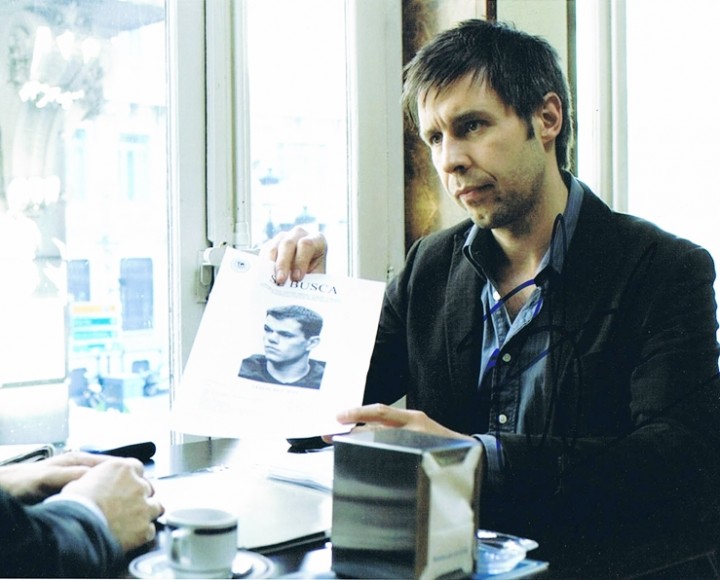
John Powell returns to the music suite, reprising many of his themes and cues from the previous films. This gives Ultimatum a sense of continuation, a throughline of compositional story, wrapping up Bourne’s self-discovery with more pulse-pounding orchestrations and rat-a-tat vibrancy. Powell’s work on all three films is, to my mind, some of the best “action film” scoring done on any franchise. It’s hard to imagine the franchise without him, to be honest. The editing, by Christopher Rouse, is visceral and gasp-inducing, as the cameras swing about the rooftops of Tangier, the streets of Manhattan, the cavities of Waterloo Station in London, and Madrid, capturing the frantic tension of Bourne’s escape and battles with assassins sent to kill him, and the CIA’s constant (and I do mean constant) pursuing of him across the continents. Lensed by previous Bourne DP Oliver Wood (U571, Die Hard 2, Mr Holland’s Opus, Face/Off), Ultimatum continues the contrasty, muted tones of Supremacy and echoes the dull tones of Identity with ease. Thankfully he’s worked on all the Bourne trilogy films, making them all appear similar in tone and providing continuity across the franchise. The film looks superb, even if at times you can’t tell what’s going on.

As with Supremacy, if you don’t like Greengrass’s handy-cam style, jittery editing and super-close framing, you’re gonna hate the way this film plays out. The camera never sits still, is always moving, and a lot of the time, seems to hide behind the very people we want to see. Conversations take place with the camera almost entirely obscured by some other person, piece of furniture or building, and the focus is usually pulled in so tight you get a flicker of eyes, some lips and occasionally, a full face. It’s distracting to a degree, but I think it works to heighten tension and give the characters some kind of furtive, obscured nature in and of themselves. After all, a lot of what happens in the story is covert, and it makes sense to have the camera feel much that way as well. That’s my theory anyway, and I’m sticking with it. If there’s a particular flaw to Ultimatum (and it’s a style Greengrass seems to have made more overt in the years since Supremacy), it would be this.
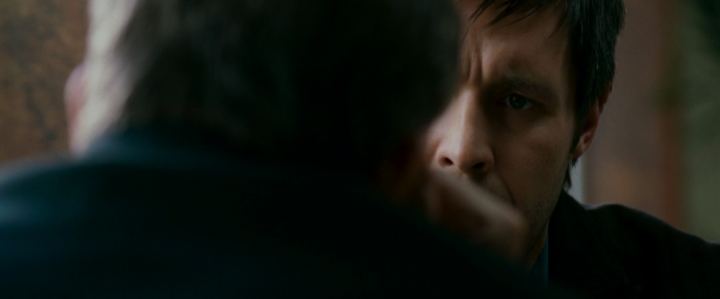
Nevertheless, The Bourne Ultimatum wraps up Jason’s journey with a bang. As I alluded in my Identity review, the three films in the franchise feel very much like they were always designed as a trilogy, as if the plan was that way all along. Whether that’s actually the case or not doesn’t matter, because it’s the end result that matters most. The Bourne Ultimatum is rousing, attention-grabbing entertainment at its most thrilling. Seeing Matt Damon drive a stolen car backwards off a multi-storey carpark roof to escape pursuit is worth the price of a ticket alone – not to mention a gangbusting Manhattan car chase (which doesn’t have the same go-go-go thrills as the one from Supremacy, but what could?) and a wonderful couple of twists in the plot – so if you can, snag all three Bourne films and watch them within a few days of each other. Ultimatum wraps things up well, and delivers solid enthusiasm from everyone involved – it’s another corker for Jason Bourne.

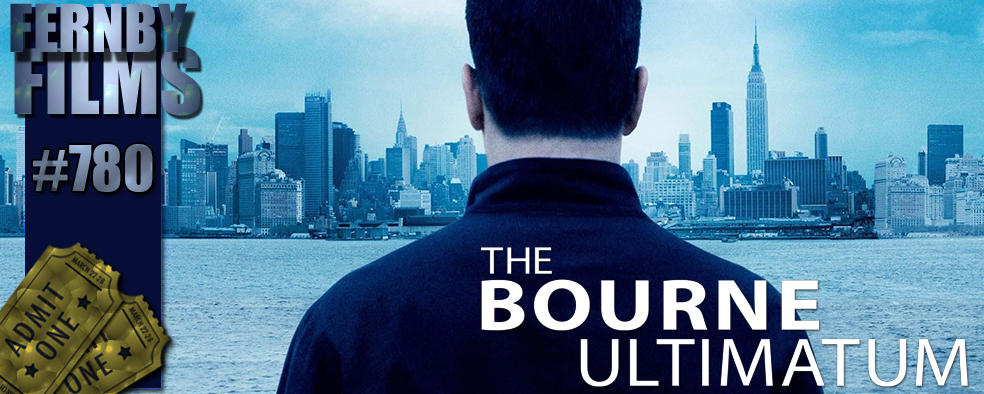
Fantastic trilogy. I really was not a fan of the shakey-cam, but the gripping story is still amazing enough to make these excellent movies. As far as I'm concerned this is a perfect trilogy, and the 4th film does not exist. Glad you enjoyed the movies.
My recent post The Expendables, Argo
Ha ha, I'm kinda with you on the 4th Bourne flick, it's a poor second cousin to this amazing trilogy. People keep saying Greengrass should come back for another Damon venture, but I think they should leave this self-contained story alone. It's great as it is.